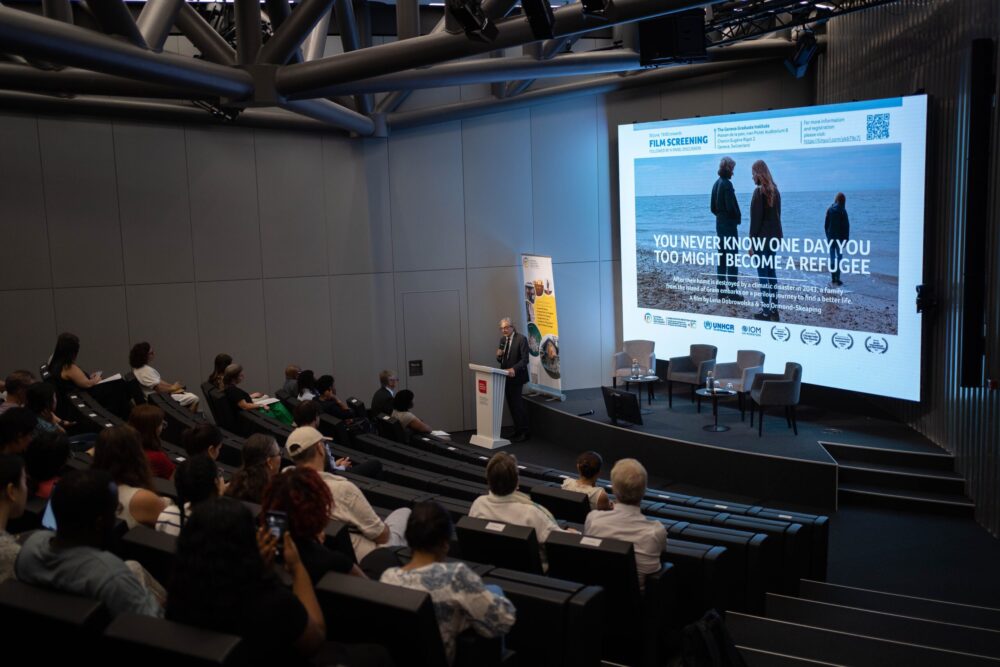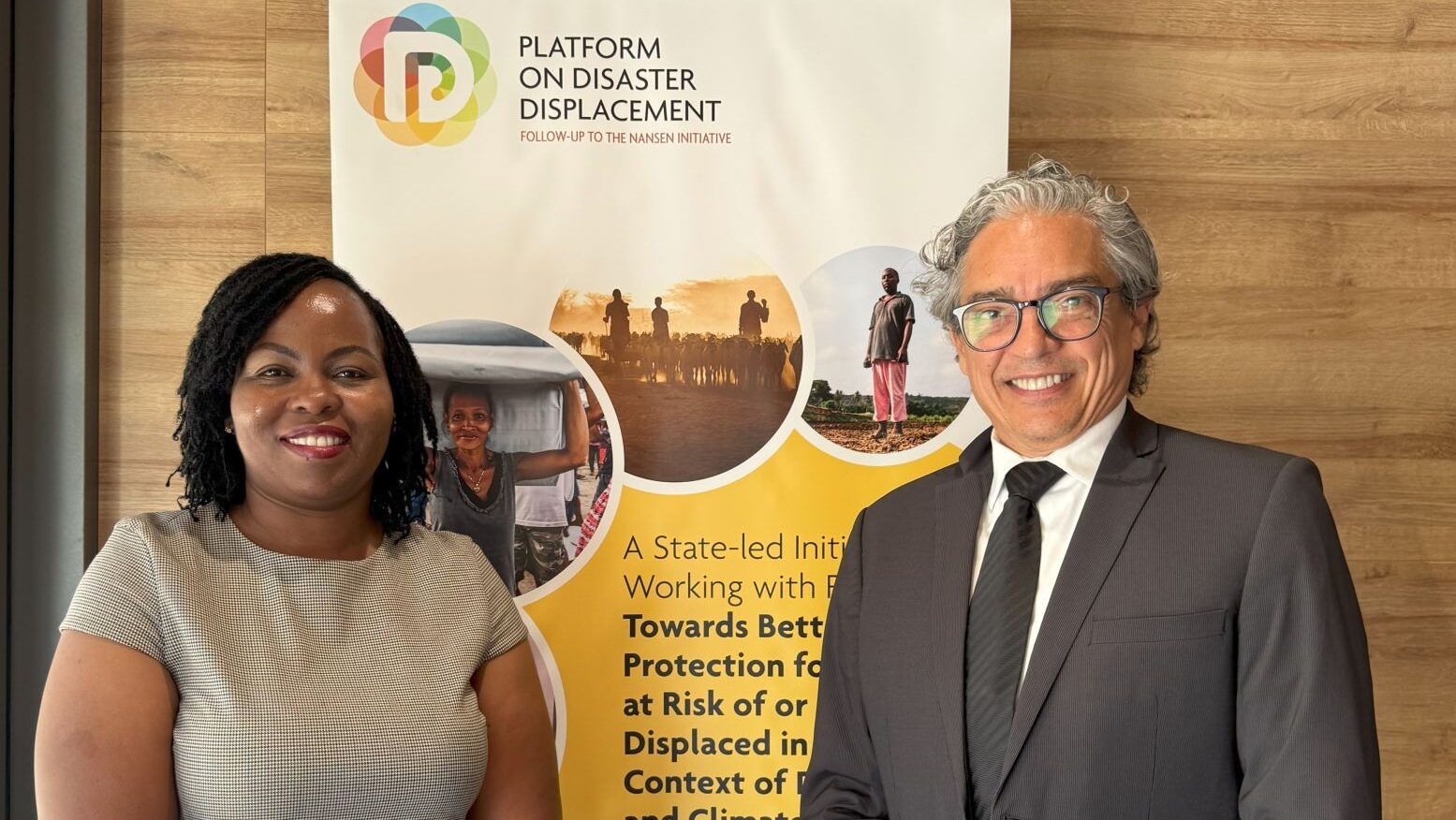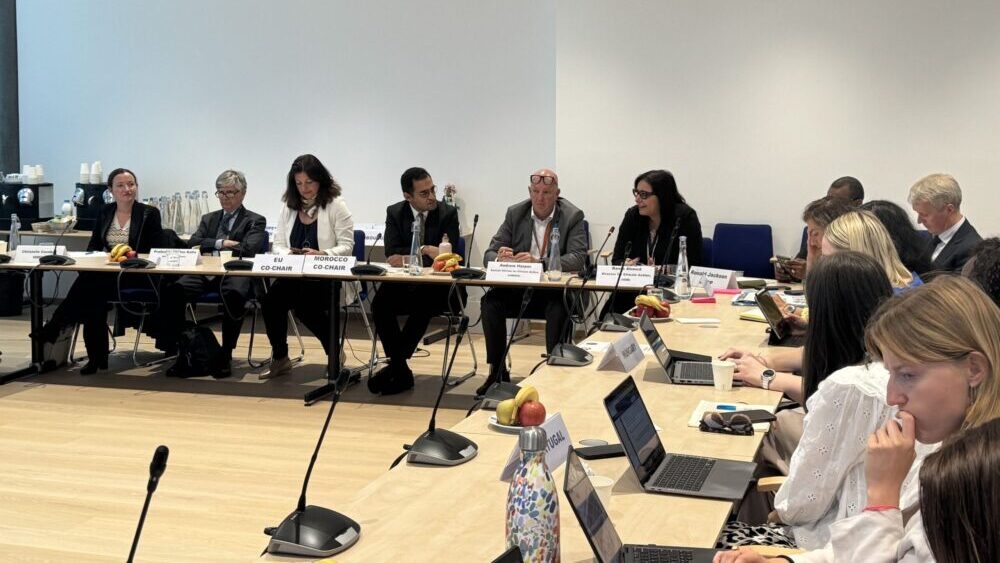Reporting Back from the 2023 United Nations Climate Change Conference
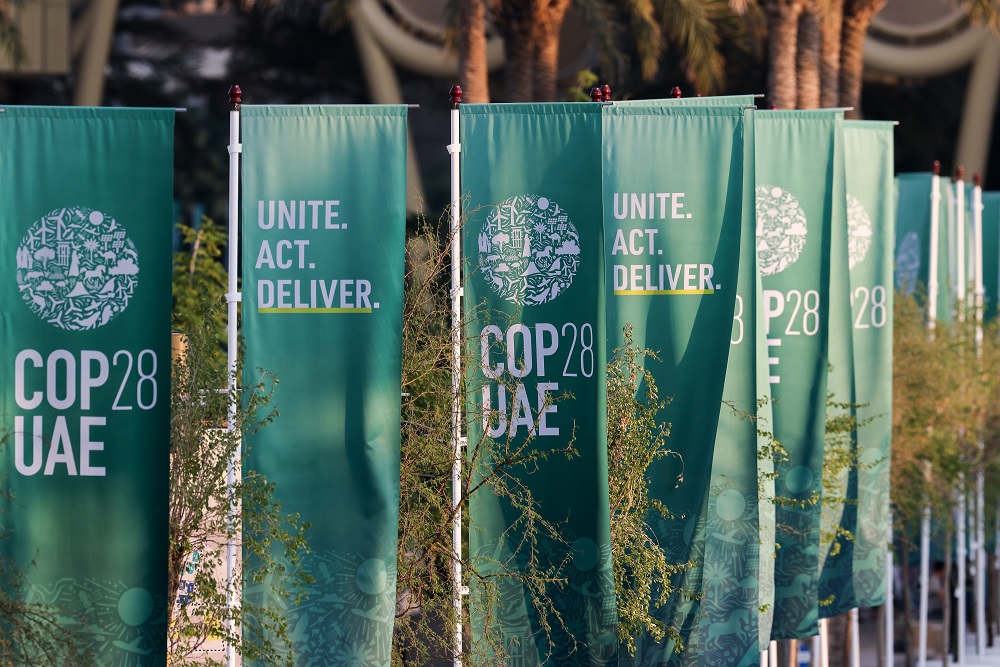
The 28th Conference of the parties attended by world leaders, civil society, business, Indigenous Peoples, youth, philanthropy, and international organizations, attracted some 85,000 participants. Not only was this edition the biggest-ever UN climate conference but the challenges of addressing human mobility in the context of the adverse effect of climate change, including disaster displacement, received high level of attention in side events and public events and in the negotiations themselves. For PDD, efforts particularly focused on highlighting the need to scale up action to avert, minimize, and address loss and damage related to the adverse effects, of climate change, including displacement and its impacts.
Disaster Displacement at COP28
The issue of displacement related to disasters and the adverse effects of climate change was addressed almost daily during COP28. According to Ms. Alice Baillat, from the Internal Displacement Monitoring Center (IDMC): “The relation between climate change and human mobility has been discussed for more than a decade in global climate negotiations, but it is striking to see how much this topic has gained attention and visibility recently.”
On day one of COP28, on 30 December 2023, Parties agreed on the Loss and Damage Fund to assist vulnerable nations in addressing climate change loss and damage. The support provided by the Fund includes promoting “safe and dignified human mobility in the form of displacement, relocation and migration in cases of temporary and permanent loss and damage.” Following this COP decision, the United Nations Office for Project Services (UNOPS) and the United Nations Office for Disaster Risk Reduction (UNDRR) were named co-hosts the Secretariat of the Santiago Network on Loss and Damage to provide technical assistance to support developing countries in averting, minimizing, and addressing loss and damage. On the last day of the COP, Parties adopted the first-ever Global Stocktake decision with a clear reference to displacement.
The Santiago Network for Loss and Damage was created at COP25 and the establishment of the Secretariat at COP28 represents the full operationalization of the Network. The significance of the decision was noted by UNDRR and UNOPS in a joint message at the closing ceremony, highlighting
the Santiago Network for Loss and Damage’s pivotal role in assisting developing nations to avert, minimise and address loss and damage.”
Notwithstanding these developments, the outcome of this year’s COP was met with mixed reviews. Many experts pointed out the disconcerting progress on mitigation and adaptation goals and hesitant commitments that hinder the possibility of staying on target, which could have grave consequences for developing nations and frontline communities.
Events by PDD and partners
During the two weeks of the COP, an unprecedented number of organizations working at the juncture of climate change and mobility joined forces to engage with different stakeholders at COP28 in several side events. In Dubai, replicating last year’s model, negotiators and other participants were able to meet and discuss climate change and displacement in the Climate Mobility Pavilion. The space, co-managed by the Global Centre for Climate Mobility (GCCM) and the International Organization for Migration (IOM), hosted a daily program of events on all the facets of climate action and human mobility. Several other pavilions also included the topic of disaster displacement in their program. The following is a sample of some of the events in which PDD was directly engaged:
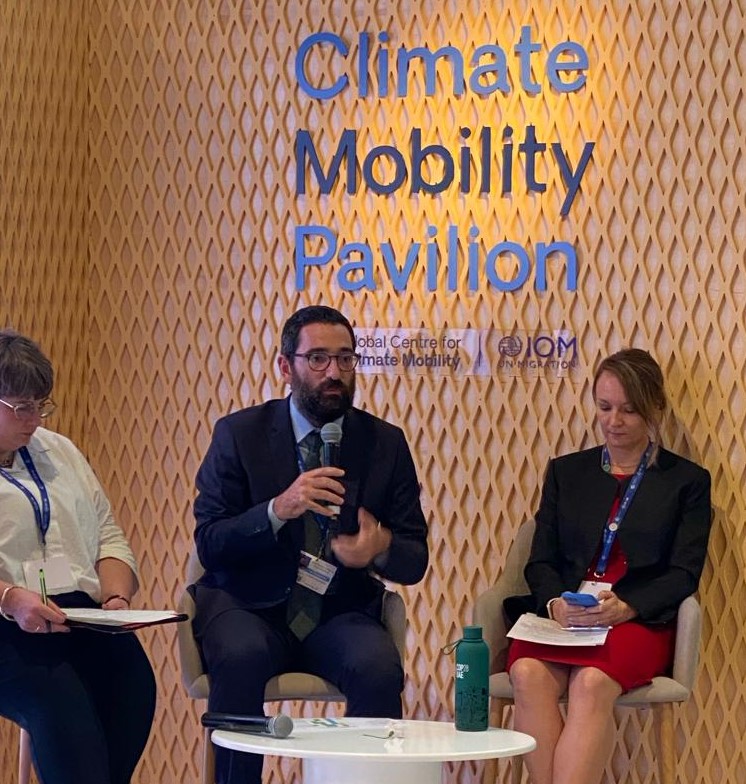
On 1 December 2023, a High-Level side event on “What Next For the Pacific Regional Framework on Climate Mobility” with the participation of the governments from Fiji. Tuvalu, the Pacific Island Forum Secretary General and IOM Director General drew attention to innovative actions to address to climate related mobility in the Pacific and reflect on the recent Pacific Regional Framework for Climate Mobility endorsed at the 52nd Pacific Islands Forum Meeting on 15 November 2023. It provided an opportunity to share lessons learned and approaches to having a whole of society approach to managing climate mobility, which may be replicated in other regions.
The UNOPS Pavilion hosted two side events on “Averting, Minimizing, and Addressing Displacement Related to Climate Change”. On 2 December, a discussion, with representatives from the governments of Kenya and Panama, the UNFCCC Task Force on Displacement, IMPACT Initiative and Climate Refugees, shared effective practices from state- and non-state actors prioritizing human mobility in climate actions and ongoing initiatives relating to the work on loss and damage and human mobility, with video-interviews of community-based organizations from across Kenya.
The following day, the PDD together with the Internal Displacement Monitoring Centre (IDMC) and the European Union, current Chair of the PDD, discussed strategic partnership between the international community and local governments on how to better implement concrete actions to avert, minimize and address loss and damage and disaster displacement as one form of it. The discussion was preceded by intervention from representatives of the European Union and the UNOPS Director.
Throughout the rest of the conference, the PDD Secretariat, Steering Group and Advisory Committee supported the organization of several events on displacement and climate, amongst other on the importance of local knowledge, regional experience and refugee representation, and were invited to speak on climate finance, legal landscape, and loss and damage.
The way ahead
This COP has again represented an opportunity for stakeholders to meet, engage in discussions and highlight mobility challenges in the context of climate change in different policy workstreams. The Climate Mobility Pavilion offered participants through a diversity of side events and informal exchanges a place to gather and debate solutions for mitigating and addressing the impacts of the climate crisis on human mobility.
Human mobility was not confined to this pavilion, other pavilion featured discussion on climate change and displacement whether through a thematic lens (e.g. urbanization, infrastructure, civil society) or national/regional (e.g. Pacific). The next climate conference in Azerbaijan could be an opportunity to further establish this issue. IOM’s Director General Amy Pope suggested the creation of a “Human Mobility Day”, which would recognize how central human mobility considerations will be to climate action in the coming years.
The recognition of displacement considerations in the progress on decisions regarding Loss and Damage and the Global Stocktake represents an important step toward creating a more robust mechanism within the UNFCCC for addressing displacement in the context of the adverse effect of climate change. Nevertheless, this platform still needs to be fully developed and leveraged to support responses that benefit the most vulnerable.
Human mobility partners have an opportunity and responsibility to substantiate these decisions, and articulate what Loss and Damage that includes human mobility considerations means. In the same vein, there is still to be done to identify ways to ensure the meaningful participation of displaced persons, migrants, refugees and other people on the move.
Nobody thinks the loss and damage will cover all… needs, but… there is now a space where loss and damage finance becomes a thing and can be recorded, and given metrics and tracked. That wasn’t the case in the past,” – Prof. Daniel Lund, Special Adviser, Climate Action, Fijian Government
Looking ahead, the PDD will continue to support policy-relevant discussions in the coming year, through its network of expert on loss and damage and the partnership with the Loss & Damage Collaboration and its Working Group on the Challenges of Human Mobility. This work will contribute to the establishment of a funding and operational architecture on loss and damage that integrates displacement considerations.
Next year will provide a window to ensure that work on displacement and human mobility is fully embedded in the assistance that countries can receive through the Santiago Network on Loss and Damage. It will be ripe with opportunities to expand ongoing partnerships on data and operations that PDD has established with IDMC and IOM to develop regional, national and local approaches to L&D and displacement. And it will be a key moment to leverage commitments countries have taken at the GRF to ensure synergies between climate action and responses to the needs of refugees and asylum seekers.
Useful Links and Documents
Re-Watch COAST Foundation press conference on Loss and Damage with the PDD Secretariat
Read IDMC COP28 Think Piece
Reflect on the L&DC Analysis of COP28
Read Steven Miron (Refugee Law Initiative) Blog Post
Read and Download our Key Messages
 Loading...
Loading...
Read and Download PDD-IMPACT Policy Brief on NELs and Displacement
 Loading...
Loading...
Read the 15 Observations of Displacement as Loss and Damage
